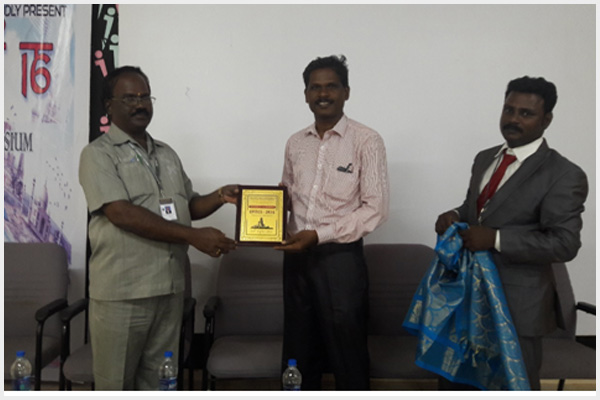



The Department of Structural Engineering was established in 1985. This was followed by a Post Graduate Programme in Structural Engineering in 2011.
All the Programmes are approved by AICTE. Mr.P.RAGUNATHAPANDIAN M.E., (Ph.D)., HOD with a well-qualified team of faculty provides the right academic atmosphere for the students to become Civil Engineers par excellence with an aptitude for research.
In the past three decades, the department has seen a lot of progress in academics, research and consultancy activities. We have a dedicated faculty team of 12 members for UG and PG programs, out of which 1 are doctorates. The Department has state-of-the-art labs and classrooms.
| Programme of Study | Description |
|---|---|
| B.E. Civil Engineering |
Started with 60 seats in 1985. Vide Ref: F.No:45-19/91 AICTE/5571 dt: 17.02.1992. Accredited by NBA-AICTE in 2004 for 3 years F. No: NBA/ACCR-375/2004, Date: 17.06.2004 Accredited by NBA-AICTE in 2008 for 3 years F. No: NBA/ACCR-375/2004, Date: 19.07.2008 |
| M.E. Structural Engineering |
Started with 18 seats in 2010-2011 Ref.No F. No Southern region / 1-4184374/2010/EOA Dt: 23/08/2010 |
We envision a department where technological resources will initiate promote and sustain the core elements of this vision. Nurturing emerging disciplines and the creation of new knowledge and artistic expression in response to a rapidly changing world.
Graduates of the Civil Engineering program of Arulmigu Meenakshi Amman College of Engineering will have the ability to
Civil engineering is a broad field of engineering that deals with the planning, construction, and maintenance of fixed structures, or public works, as they are related to earth, water, or civilization and their processes. Most civil engineering today deals with power plants, bridges, roads, railways, structures, water supply, irrigation, the natural environment, sewer, flood control, transportation and traffic. In essence, civil engineering may be regarded as the profession that makes the world a most comfortable place to live.
The Department has well equipped laboratories with necessary computer systems with various software and equipment. Each laboratory has adequate space as per the AICTE norms and also meets all the requirements as per the Anna University norms. The following are the laboratories associated with CIVIL Engineering Department.
The Department has fully equipped state-of-the-art laboratories supervised by experienced faculty members.








A basic knowledge of Fluid mechanics is essential for all the civil engineers as they frequently come across a variety of problems involving flow of fluids, force of fluid on structural surfaces etc. This laboratory is used for experimentation on the properties and behavior of fluids.
The Area of the lab is 308 sq.m

The soil lab provides academic and research services through performing all lab tests needed for analysis and study of soil characteristics and its properties.
The Area of the lab is 203 sq.m


Concrete is the most widely used construction material. The concrete laboratory tests every component in the concrete mix design as well as the concrete mix itself. The lab provides evaluation of the plastic properties of the mix as well as the hardened properties.
Highway Engineering lab consists of equipment used in the testing of bituminous materials such as viscosity, ductility and plasticity and other devices for super-pave testing of bitumen and aggregates. There are other devices for mix design by both Superpave and Marshall Methods. The Area of the lab is 206 sq.m


The Environmental Lab comprises of modern and technically advanced instruments needed for water and wastewater analyses. The lab has also many in-situ devices and equipment to perform different types of measurements and to take grab and composite water, wastewater samples
The Area of the lab is 187 sq.m
The CAD Lab is equipped with AutoCAD software and is extensively used for design and drawing. The knowledge gained in the lab eventually equips the students to provide quality service once employed in the industry.
The Area of the lab is 288 sq.m
The survey lab is used for surveying exercises and is equipped with all latest instrumentation viz levels, total stations, and GPS receivers sets for conducting ground surveying works.
The Area of the lab is 588 sq.m


This lab is equipped with the major equipments like Universal Testing Machine, Torsion Testing machine, Beam Testing Apparatus, Rockwell Hardness Testing Machine, Brinell Hardness Testing Machine, Impact Testing Machine, Muffle Furnace and Minor equipments like Metallurgical microscopes, Vicat Apparatus, Le-Chatelier mould, Le-Chatelier Flask etc. Students gain the practical knowledge through these equipments with the help of the Lab manuals. Various tests related to the mechanical properties are conducted in this lab. This lab is utilized by both the civil and mechanical engineering students.
The Area of the lab is 198 sq.m

The Advanced Structural Engineering Laboratory is equipped with Loading frame 100T capacity for both Horizontal and Vertical loading, Rebound Hammer, Ultrasonic Pulse Velocity Tester, Hydraulic Jack with 10T,20T,30T, Load cell with 7.5T,15T,30T With Indicator, Proving Ring, Strain Indicator, Hydraulic Crane (2T), Vibration Meter & Exciter-5N capacity. Structural Analysis experiments help to understand, to know the practical behavior of the physical structures like beams, Slabs, Column etc. A proper structural analysis of these structures helps the students to solve the practical problems.
The Area of the lab is 308 sq.m


A Special Lecture on Recent trends and advances in Civil Engineering organized by the Department of Civil Engineering. Dr.V.Jothi Prakash, Associate professor, Department of Civil Engineering IIT Mumbai, Dr.C.Jagadeesan, Principal Dr.G.Sundar, vice principal presided over the function

Sathanur dam, ponnaiyur, Tiruvannamalai, To learn the construction details, water distribution, irrigation structures and working of gallery.


One day workshop on how to complete Ph.d, Higher Education Academy, London



| S.NO. | NAME | DESIGNATION | DEPARTMENT |
|---|---|---|---|
| 1 | Dr. DHANAPRIYA V P | ASSOCIATE PROFESSOR | ME-SE |
| 2 | Ms. SONIYA V | ASSISTANT PROFESSOR | ME-SE |
Coming Soon.
Coming Soon.